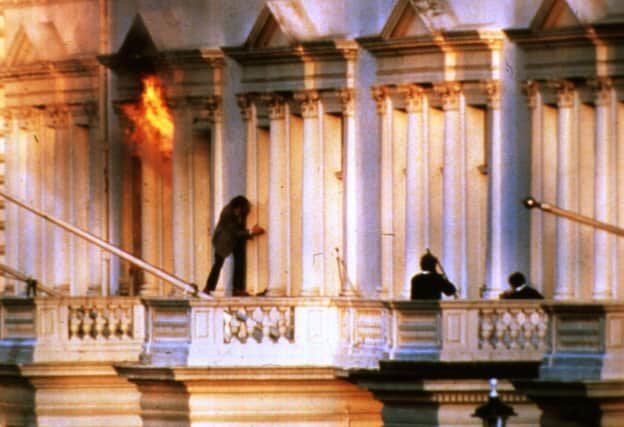SAS death squads exposed? We need an independent judge-led inquiry into serious allegations about SAS in Afghanistan – Lt Col Stuart Crawford


Apparently some four years in the making, the programme took a measured and appropriately inquisitive look at how Britain’s best-known special forces outfit operated and how it might have transgressed the normal laws of war during that conflict.
Predictably it has led to an outburst of spluttering from the usual Bufton-Tuftons who spend most of their days in the leather armchairs of various London clubs, whose consensus view seems to be that it is an outrage that the reputation of Britain’s elite warriors has been smeared in this way.
Advertisement
Hide AdAdvertisement
Hide AdOn the other side of the fence, various leftie journalists and commentators have already called for the immediate disbandment of the SAS and the arrest and trial of all those allegedly involved in the killings.
I am in neither camp but somewhere in-between. However I do agree with the band of assorted senior retired military officers that the allegations are serious enough to warrant some sort of independent inquiry.
And by independent I mean truly independent; the Royal Military Police, God bless’em, come under the army chain of command and cannot be described as independent by any stretch of the imagination. No, it needs to be carried out by someone or some organisation with no military links whatsoever. The favourite tabloid phrase “judge-led” springs to mind.
But let’s look at the allegations which have been made. Briefly, the Panorama programme suggested that the SAS, and their little brothers the SBS, were basically a law unto themselves in Afghanistan, operating outside the in-theatre chain of command.
The most serious charge is that they summarily executed unarmed Afghan boys and men of fighting age, some of whom had already been restrained and rendered helpless, in some macabre competition between units over who could achieve the highest number of kills.
To compound matters, it is claimed that they then planted weapons on the dead to justify their actions.
If proven, such charges are quite clearly illegal and totally at variance with the laws of armed conflict, and the perpetrators are essentially war criminals who should face justice. The question then arises as to how this could happen.
How could a disciplined military unit “go rogue” like this and become an outlier in the British military? There may be several reasons for this.
Advertisement
Hide AdAdvertisement
Hide AdThe SAS was a relatively obscure and unheralded outfit until they burst into the public’s consciousness at the Iranian Embassy siege in London in 1980. Their famous assault, abseiling from the roof and blowing out window frames, was carried on live television to an incredulous audience and became one of the defining moments of both Margaret Thatcher’s premiership and British military history. The unit was lionised by the media and politicians alike and became globally famous.
Through this and subsequent actions the unit developed a guid conceit o’ itsel, much of it undoubtedly deserved. As an officially sanctioned “elite” organisation, senior officers became wary of interfering with their modus operandi and became increasingly hands-off, maybe too hands-off.
The SAS famously has a relaxed attitude to such things as rank and dress, both staples of the ethos of most armies, but in their case it perhaps was allowed to go too far and morphed into a kind of canteen culture where the tail began to wag the dog.
As the old army adage has it, there are no bad regiments, just bad commanding officers. Time and again when discussing the Panorama report with my ex-military friends, the same question is asked: what were the officers doing during all of this?
The commanding officer usually sets the tone and culture for the regiment he commands, and this is followed by his junior officers right down to the lowest level and sets the tone of the whole regiment.
How, therefore, might this have gone so badly wrong in one squadron – at least – of the SAS in Afghanistan in 2010-11? The answer might be that the leadership was weak and the canteen culture flourished. And the junior officers, who one would expect to intervene when it appeared that things were not quite right, may have come to regard themselves as more “one of the lads” than representatives of authority, and just rolled over and let their men get on with it. To be clear, this is all conjecture, but there may be an element of truth in it.
The worst result, though, is that the British army may have lost the moral high ground in its defence of British interests and betrayed the values and standards which we should hold dear.
Look what happened to the Americans when details of extraordinary rendition, black sites, and Guantanamo Bay emerged. They lost the moral high ground comprehensively and have struggled to regain it ever since. When you lose the moral high ground, you have lost the war.
Advertisement
Hide AdAdvertisement
Hide AdIn Andy McNab’s book Bravo Two Zero, his account of the disastrous insertion of an SAS patrol into Iraq in the first Gulf War, he recounts how at one point they were discovered in their hiding place by a shepherd boy.
The militarily sensible thing to have done would have been to eliminate the threat, but after discussion he and his fellows decided that they were the SAS, not the SS, and the boy lived and went free. Would the squadron in Afghanistan have come to same conclusion?
We need a full and independent inquiry into the allegations made in the Panorama programme so that either the Regiment can clear its name or the criminals in its ranks can be brought to justice.
Stuart Crawford, a former Lieutenant Colonel in the Royal Tank Regiment, is a defence and military commentator
Comments
Want to join the conversation? Please or to comment on this article.
